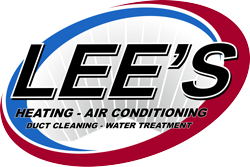There are a number of things that may influence our health on a regular basis, and one example that sometimes doesn’t get enough attention is indoor air quality. Poor air quality can often have a direct negative impact on health, and this can actually happen in several ways – making indoor air quality a vital consideration.
At Lee’s Heating and Air, we’re happy to offer a wide range of HVAC services to clients around Salt Lake City, Provo, American Fork and nearby areas – including air quality solutions like air filters, humidifiers and more. Here are some of the key health risks that may be associated with poor indoor air quality, including some that can be quite significant for some people.
Allergy Symptoms
One of the most well-known risks of poor indoor air quality is that it can cause an increase in allergy symptoms and other breathing ailments. This isn’t just restricted to people with existing allergies, either – even those without existing sensitivity may find their allergy symptoms triggered, or develop new ones, if the air quality isn’t up to standard.
For instance, irritants like smoke, dust mites, pet dander and other allergens can build up in the air over time if it’s not adequately filtered or humidified – leading to hay fever symptoms, coughing and wheezing, or even more severe asthma-like reactions.
Asthma Issues
Another way that poor indoor air quality can influence health is by exacerbating existing asthma issues, or even leading to onset of the condition. As with allergies, this is often due to buildup of allergens and irritants in the air – either because adequate ventilation isn’t present, or because it’s not properly filtered.
In some cases, this may lead to more severe asthma attacks than usual, and in some cases it may even lead to onset of the condition in people who have never had it before. For this reason, if you or anyone in your family has asthma, monitoring the air quality inside your home is particularly important for their health.
Headaches, Dizziness and Fatigue
In some other cases, poor air quality may lead to more general health issues such as headaches or even feeling light-headed and dizzy. This is often due to lack of oxygen in the air something that happens when there’s much carbon dioxide present, inadequate ventilation or buildup of chemicals like smoke.
In some cases, this can even lead to chronic fatigue – something that’s often associated with too much carbon dioxide in the air, which can cause oxygen levels to drop. In any case, if your home’s air quality isn’t up to par, it may be worth exploring ways to improve it, as this could have a positive effect on health for all who live there.
Respiratory Conditions
Getting into some of the more serious risks associated with poor air quality, there are a number of respiratory conditions that may be directly linked to it. These include bronchitis, COPD (Chronic Obstructive Pulmonary Disease) and more – all of which can have severe effects on the health of sufferers if not adequately managed.
These issues may be caused by in the air (often found in dust or smoke), as well as fumes and chemicals that can build up if ventilation isn’t sufficient. In serious cases, this may lead to permanent damage – so monitoring your indoor air quality is a key part of maintaining good health for everyone who lives there.
Heart Disease
Another grave risk associated with poor air quality is the potential for an increase in heart-related issues. This can be linked to a number of different factors, such as a buildup of allergens or chemicals that can directly affect cardiovascular health, as well as increases in stress hormones due to lack of oxygen levels.
Cancer Risks
Finally, some studies have even linked poor air quality to an increased risk of certain types of cancer. This is most often associated with the inhalation of carcinogenic particles, such as those found in smoke or fumes, and it’s a risk that becomes more significant when there isn’t enough ventilation present.
For this reason, monitoring the air quality inside your home is key to maintaining good health for everyone who lives there – particularly if anyone has a history of asthma, allergies or heart-related conditions. Overall, taking air quality into account is an important part of engaging in proactive health management.
It’s also worth noting that the effects of poor air quality don’t just affect people directly exposed – the impact it has on health can also spread to others in the vicinity, so there’s an even bigger reason to ensure your air is up to standard. Taking things like ventilation, filtration and general maintenance into account can make a big difference – so long as you remain aware of the potential risks associated with poor indoor air quality.
At Lee’s Heating and Air, we understand how important indoor air quality is. That’s why we offer a range of products and services designed to help you keep your air as clean and safe as possible, so that you can make sure you, your family and anyone else who spends time at home are all breathing easy. To learn more about these or any of our HVAC services in SLC, Provo and American Fork, contact us today!


